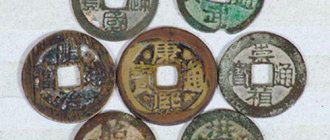The People's Bank of China (PBOC, English Bank of China) (Chinese: 中國人民銀行, exemplar: 中国人民银行, pinyin: Zhōngguó Rénmín Yínháng, pal.: Zhongguo Renmin Yinhan) is the central bank of the People's Republic of China. According to available data, the Bank of China has the largest gold and foreign exchange reserves in the world, the volume of which exceeds 3.2 trillion. US dollars.
Headquarters of the People's Bank of China in Beijing
History of the People's Bank of China
The People's Bank of China was the result of the merger and nationalization in 1947 of three major commercial banks: Huabei Bank, Beihai Bank and Xibei Agricultural Bank. Due to the civil war, the PBC headquarters were located in Shijiazhuang and were only moved to Beijing in 1949.
Between 1949 and 1978, the Bank of China was the only bank in the country. The scope of his activities included not only the functions assigned to the Central Bank, but also those characteristic of commercial banks, including servicing organizations and private deposits.
In 1980, a reform was carried out, as a result of which four independent state-owned banks were created to conduct settlements in the country. By decision of the State Council of China, since 1983, the PBOC began to perform exclusively the functions of the Central Bank.
Legally, the functions of the Central Bank were finally determined at the third plenum of the National People's Congress in March 1995.
As a result of the structural reform of 1998, all provincial and local branches of the People's Bank of China were abolished. The boundaries of the currently existing nine branches of the NBK do not correspond to the administrative division.
In 2003, the Bank of China received additional powers to ensure financial stability and pursue the established course of monetary policy.
China's credit rating from Standard Poor's
China's credit rating from Standard Poor's is A+, like Japan, Ireland, Chile, and Slovakia.
- France, UAE, UK, Belgium have a higher AA rating;
- Below with an A- rating are Spain, Botswana, Malta, and Malaysia.
The A+ rating is investment grade and means a moderately high ability to timely and fully fulfill debt obligations, but significant sensitivity to adverse changes in economic, financial, and commercial conditions.
Structure and functions of the Bank of China
The management of the Bank of China is carried out by the governor and his deputies. Their appointment to office, as well as their removal from office, is within the competence of the President of the People's Republic of China with approval by the National People's Congress.
The People's Bank of China includes 19 departments, including: general department, legal, monetary policy, foreign exchange, financial stability, etc.
Governor of the People's Bank of China Zhou Xiaochuan
In addition, the Bank of China includes an anti-money laundering center, a banking school, a news agency, a financial literature publishing house, banknote and coin production enterprises, and other organizations.
Currently, the NBK has two main functions: conducting monetary policy and regulating the financial sector.
A number of experts point out that the Chinese yuan is undervalued relative to other world currencies, providing China with significant advantages in trade, and see this as the role of the Bank of China, which keeps the yuan quotes at the required level through its reserves.
It is noteworthy that the interest rate set by the People's Bank of China is calculated by economists in such a way that it is a multiple of 9, since this number is sacred in China. The NBK has set a standard according to which there are exactly 360 days in a year, and there are always 30 days in a month. To avoid periodic fractions and other difficulties when calculating daily interest rates, the annual interest rate should be divided by 360 and, accordingly, by 9.
Basic banking services
Speaking about what functions and operations of the central bank of China are the main ones, the following should be noted:
- implementation of monetary policy;
- issue of money supply and control of its circulation;
- administering the activities of financial institutions in accordance with existing regulations;
- exercising supervision and control over the financial market;
- management of state foreign exchange reserves and gold reserves;
- formation of the main interest rate;
- establishing rates for contributions to the reserve fund from money received from credit institutions;
- rediscounting of bills for credit institutions that are clients of the central bank;
- providing credit loans to private commercial banks;
- trading currencies and government bonds on the stock market.
All commercial banks in China (including the Big Four state-owned commercial banks) provide the following banking services:
- providing loans and attracting deposits;
- performing payments and servicing customers through cash registers;
- financing of investments by order of investors for the funds of depositors, as well as for the funds of the bank;
- issue, storage and sale of securities;
- provision of sureties and guarantees to third parties for financial transactions;
- sale and purchase of foreign currencies;
- sale and purchase of expensive stones and metals, as well as jewelry;
- the use of expensive metals as deposits;
- attraction and management of financial assets and securities on behalf of clients (trust operations);
- carrying out leasing operations, providing consultations, as well as brokerage services;
- opening bank accounts.
Opening an account
Foreigners can easily obtain a bank card in China. There are several options for opening an account in a Chinese bank for foreign citizens:
- Opening an account in foreign currency to receive wages. Foreign workers in China are allowed to receive wages in any currency; this requires an employment contract that specifies a clause on payment of wages in foreign currency.
- Opening an account to receive wages in Chinese yuan. In order to subsequently exchange the Chinese yuan for the currency you need, you must provide the bank with a work contract, a work permit in China, a work visa, as well as proof of tax payment indicating the amount of salary.
- Opening an offshore account for a foreign company. This account can be opened in US dollars, Hong Kong dollars or euros. However, it should be borne in mind that when it comes to opening offshore accounts, banks can act at their own discretion, so opening an account largely depends on the choice of financial institution.
- Opening an account for a non-resident company in Chinese yuan. The procedure for opening an account for a foreign company that is not a resident of the PRC takes slightly longer than opening an offshore account, since it requires an agreement with the People's Bank of China.
Required documents
To open an account in a Chinese bank, an individual only needs to have a foreign passport, a Chinese phone number and 20 yuan to pay for the card. The bank provides several forms to fill out in the form of a questionnaire, in which you should indicate your passport number, name, phone number and what you do in China (work, business, study). After signing the forms, bank employees issue a passbook, which is designed to display all completed financial transactions, or a debit bank card (depending on your request).
As for a credit card, it will be quite difficult for a foreigner to get one. To do this, the applicant must have a guarantor who has Chinese citizenship. In addition, many banking organizations set an amount of 3-5 thousand US dollars as a “non-burnable balance”.
When opening bank accounts, legal entities may be subject to additional requirements - this depends on the rules of individual banks. Basically, before opening an account, foreign companies must establish a subsidiary in China. In this case, the account registration process is relatively quick and simple. If you do not have confirmation of ownership of a subsidiary in China, then the list of required documents will be somewhat larger than usual, and the process itself will be longer and more complex.
International money transfer
There are several methods you can use to transfer money between China and other countries:
- bank transfer;
- international systems Western Union, MoneyGram, Contact, Unistream;
- Chinese payment system Union Pay;
- electronic money (Webmoney, Qiwi or other electronic wallets).
How to get a loan
All foreign individuals and legal entities have the right to apply for a loan from Chinese banks. However, in practice, it is quite difficult to get an affirmative answer from a Chinese financial institution. Chinese banks are afraid to issue loans, since if problems arise, they will have to be resolved through the court of the country of which the borrower is a citizen. Therefore, before contacting a bank for a loan, you must carefully review the required documents and provide certain guarantees (collateral). In particular, the loan volume must be at least $10 million, and at least 60% of this money must be used to pay for services and purchase goods in China.
How to get a mortgage
To obtain a mortgage loan from a Chinese bank, you must meet two basic requirements:
- work in China for more than one year on a work visa (it is preferable to purchase real estate in the city in which you work);
- have a guarantor in the person of a Chinese citizen (such guarantors are usually employers).
If these requirements are met, you can begin collecting the necessary documents. You will need:
- passport;
- resident card;
- any document confirming solvency (certified by the Chinese Embassy in your home country);
- a certificate from the place of employment indicating the amount of wages;
- confirmation of tax payment for the last year;
- work contract;
- marriage document or certificate confirming that the applicant is not married (translated into Chinese);
- a photocopy of the license of the organization providing the workplace.
Offshore accounts in Hong Kong
Hong Kong is a Special Administrative Region of China that does not impose income tax on businesses operated outside the region. Therefore, owners of companies located in mainland China often open accounts in Hong Kong. You can open an offshore account in Hong Kong for a company located in mainland China if you are the owner of a company that has existed for more than one year and has a capital of at least $10,000. Additionally, you must provide a certificate confirming full payment of all debts and necessary fees (Certificate of Good Standing), as well as a letter from the bank whose client the company is, confirming its solvency.
"China Development Bank"
Founded in 1994, China Development Bank has also become one of the most reliable in the world during its existence. The organization has over 30 branches throughout the republic, and also sponsors many international projects: not so long ago, news was published about the provision of a loan to China Development Bank for the construction of the Moscow-Kazan high-speed highway.
Deposits with the Chinese Development Bank are an excellent opportunity to earn money. Also, China Development Bank provides the following services:
- issuance of consumer loans, business loans;
- sale of shares;
- currency exchange;
- issue of bank cards;
- storage of funds.
The website www.cdb.com.cn/English/ has been translated into English. Bank phone number: 86-10-68306688; fax: 86-10-68306699; email China Development Bank support service is available on WeChat, Sina Weibo. The head office is located at the following address: No18 Fuxingmennei Street, Xicheng District, Beijing.
China Development Bank
Postal Savings Bank of China
The Postal Savings Bank of China was founded in March 2007 and is the largest in the country in terms of the number of branches. It issues consumer loans in local currency, accepts cash deposits, and issues debit cards. You can easily find a Postal Savings Bank of China ATM in almost any area of Beijing, Hong Kong, Shanghai and other cities.
Insurance services are provided. You can insure the apartment, as well as the interior decoration and furniture; car or other vehicle; your health; harvest if you plan to engage in agricultural activities.
China bank PSBC makes flat market debut
HSBC
Once upon a time, HSBC bank had a bad reputation because it was where the “stars” of European criminals kept their ill-gotten money. Today, HSBC can be called one of the leading Chinese companies. The company's staff speaks several languages at the same time, and you can also order cards from the local operator UnionPay.
There are more than a hundred HSBC branches throughout the country. This option is very beneficial for residents of Hong Kong and Shanghai - there ATMs and branches themselves are located almost at every step. Individual and corporate clients have access to online banking.
HSBC China CEO David Liao on China's financial market opportunities
International Commercial Bank
The International Commercial Bank network was founded in Europe, but quickly spread throughout the world.
ICB offers the following services in more than 20 countries, including China and Russia:
- carrying out monetary transactions with foreign currency;
- currency exchange;
- provision of individual bank safes for storing valuables and documents;
- issuance of cards from operators UnionPay, Maestro, Cirrus, MasterCard, VISA, VISA Electron in one of three currencies: dollars, rubles or euros;
- money transfer using Western Union;
- issuance of investment commemorative coins;
- settlement and cash services;
- issuing VIP VISA Infinite cards with premium services around the world, including legal and medical assistance.
Bank of China
“Bank of China”, as the name Bank of China can be translated, is an important financial group. The bank has been among the most significant since 2011. Over more than a century of history, this financial organization has become one of the most influential in the state market and has gained significant control over it. This state network has more than 700 branches in different countries. This bank also has a representative office in Russia - on the website boc.ru you can find out information about available services (issuing consumer loans, carrying out transactions in yuan, deposits, currency exchange). There are also contact details, such as: address (Moscow, Prospekt Mira, 72), phone number (+7 (495) 258-5301), e-mail ( [email protected] ). Unfortunately, cards are not issued for Russians.
In China itself, this company can be called an analogue of the familiar VTB or Sberbank. Bank of China offers citizens of the republic making deposits, processing money transfers, currency exchange, and issuing debit and credit cards. For legal entities, Bank of China provides cash settlement services, issuing loans in yuan, currency control and other services.
Banks of China: Bank of China 100years 1280
Agricultural Bank of China
The third largest bank in terms of assets in the world is Agricultural Bank of China, which also has a representative office in the Russian Federation. Founded in 1951 to finance collective farms and farms.
In our country, it has been managed since 2015 and is engaged in issuing credit cards, issuing loans in yuan, settlement services, and trade finance services. The same activities are carried out by the bank in China. The head office in Russia is located in the capital, at the address: Lesnaya street, building 5, building “B”.
Read other CHINA NEWS Ant Group's IPO will be the largest in history
Corporate users have the opportunity to use the bank online using the faktura.ru system developed by the Center for Financial Technologies.
There are branches, subsidiaries and representative offices of the Agricultural Bank of China in other cities: Vancouver, New York, Dubai, Tokyo, Singapore, Seoul, Frankfurt am Main, Sydney, London, Luxembourg.
International website: https://www.abchina.com; Russian: https://www.ru.abchina.com/ru/default.htm.
Banks of China: Agricultural Bank of China
Industrial and Commercial Bank
ICBC also has significant influence on the Chinese economic market. It was founded back in 1984. Industrial and Commercial Bank has been a leader in the Forbes Global 2000 ranking since 2012. When creating a rating, Forbes analysts rely on the size of revenue, net profit; number of assets; market capitalization of firms.
This bank is one of the few in China that works with the Western Union system. For comparison, the Agricultural Bank of China and China Construction Bank have completely refused to work with this international service, offering people to instantly receive and send money.
It is worth noting that ICBC was the first to offer multi-currency debit cards. They are very useful for people who often fly abroad or are in China only for work. Multicurrency cards allow you to avoid double conversions and, therefore, unnecessary costs.
Banks in China: ICBC - Industrial and Commercial Bank of China
Huaxia Bank
This commercial bank was founded in 1992 and, at the time of writing, ranks 265th in the Forbes Global 2000. Shares of Huaxia Bank have been listed on the Shanghai Stock Exchange since September 2003. The main direction of the company is the issuance of debit and credit cards managed by the operator UnionPay; issuing loans, car loans.
There are special conditions for the most active clients. For example, for a person whose account contains more than 7 million yuan, a “Diamond” card is issued. But there are individual offers not only for large businessmen - you can familiarize yourself with the entire list of bonuses and services by following the link: www.hxb.com.cn/en/.
These individual conditions are a rather interesting thing that is rarely found anywhere. Among the pleasant little things, we can highlight that the bank will not just send an SMS congratulations on your birthday, but also, depending on the level of activity, will give you a coupon for a free dinner at a restaurant.
If you have questions, you can contact the organization’s support service by calling +86-95577 or using the online form on the official website. The head office is located in Beijing: Hua Xia Bank Plaza, No.22 Jianguomennei Street, Dongcheng District.
HuaXia Bank











